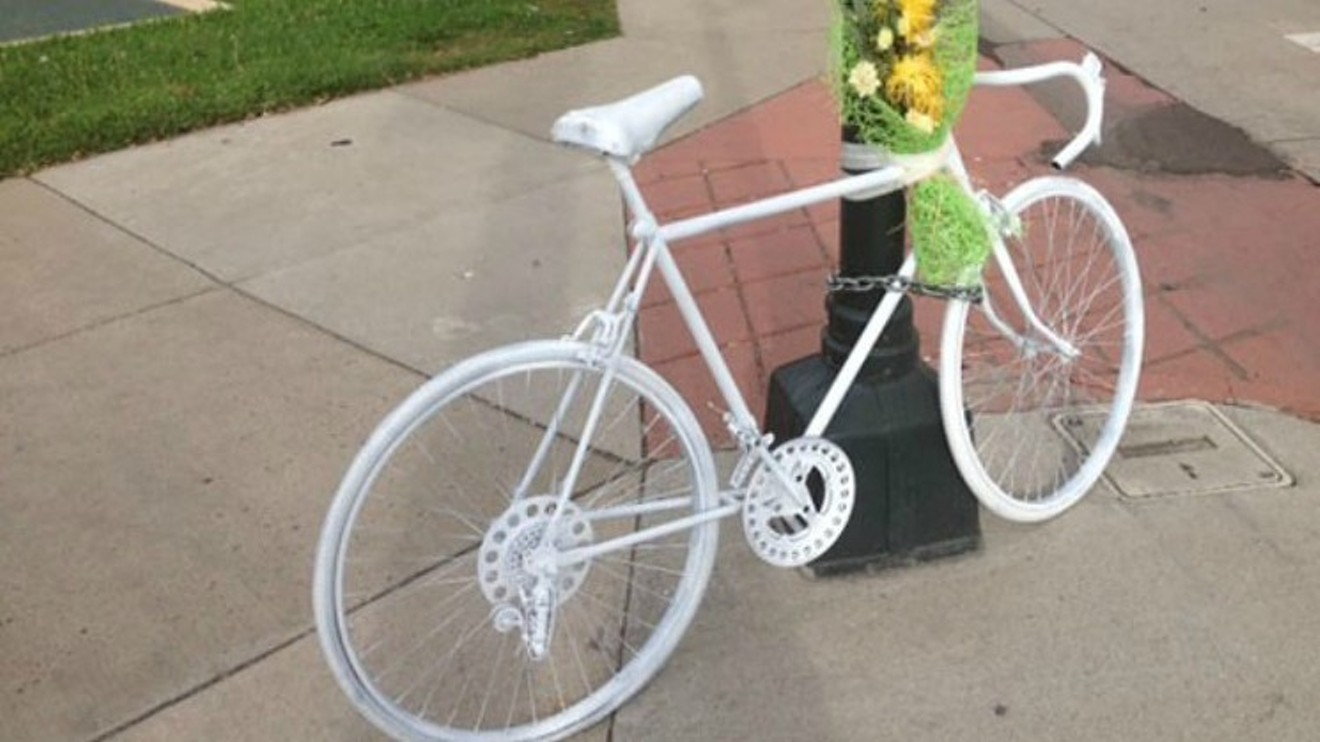With the number of traffic deaths in Denver this year having already surpassed 2018's total of 61 (at this writing, the fatality count stands at 63), advocates believe that lowering residential speed limits will make city streets safer.
A plan to study and potentially implement the concept was put forward earlier this month by Denver City Council, and Mayor Michael Hancock has now given it a partial blessing. In a letter to council accessible below, Hancock offers $200,000 toward such a program — a little over half of the $350,000 originally requested.
Not that Piep van Heuven, policy director at Bicycle Colorado and chair of the Denver Streets Partnership, a coalition of nonprofit advocacy groups working together to increase safety on the city's roads, is complaining. "It's obviously a very good step," she says. "It's exciting to see this conversation move forward."
The idea is to reduce the speed limit on unmarked residential streets in Denver from the current default of 25 miles per hour to 20 mph — an effort promoted by the slogan "20 Is Plenty." As demonstrated by the following Bicycle Colorado graphic, such switches are more substantial than they might seem at first blush.
"Even five miles per hour can make a big difference if there's a crash between a car and a person," van Heuven says. "It can make the difference between a person being seriously injured or it being a lot worse."
Denver City Council member Paul Kashmann agrees, and he spearheaded the $350,000 proposal to fund "an additional traffic engineer to gather information about what the conditions are on the ground, how many miles do we have on neighborhood streets that are rated at 25 miles per hour, how many signs do we need to buy and replace," as well as to "engage a consultant team to examine best practices around the country and look at how something might be rolled out in an effective way."
Because six of Kashmann's colleagues signed on, the entreaty was sent to Hancock, who responded in the aforementioned letter like so: "The Department of Public Works will identify $200,000 from 2019 budget savings to determine if and how to expand speed reduction efforts currently underway in addition to their current work to ensure safe mobility and transportation options for all modes."
The phrasing makes the dollar amount seem less than solid, but mayoral spokesperson Mike Strott acknowledges that although it's "technically contingent on savings...the funding is there, so it will be allocated for this. Public Works will use the money for consulting services to evaluate options around reducing speeds across the city."
In other words, there's not enough dough to hire that additional traffic engineer. Kashmann hopes the decision won't cause progress to lag. "I appreciate the challenge the mayor faced in balancing competing budget needs," he notes via email, "but I believe lowering speeds is critical to pedestrian, cyclist and motorist safety, and I’ll continue to advocate for the funds needed to make that happen."
In the meantime, van Heuven says, "What we see on the streets is the public really calling for this. We hope the city will fast-track these efforts, because they can save lives."
Click to read Mayor Michael Hancock's response to Denver City Council's 2020 budget requests.
[
{
"name": "Air - MediumRectangle - Inline Content - Mobile Display Size",
"component": "12017618",
"insertPoint": "2",
"requiredCountToDisplay": "2"
},{
"name": "Editor Picks",
"component": "17242653",
"insertPoint": "4",
"requiredCountToDisplay": "1"
},{
"name": "Inline Links",
"component": "18838239",
"insertPoint": "8th",
"startingPoint": 8,
"requiredCountToDisplay": "7",
"maxInsertions": 25
},{
"name": "Air - MediumRectangle - Combo - Inline Content",
"component": "17261320",
"insertPoint": "8th",
"startingPoint": 8,
"requiredCountToDisplay": "7",
"maxInsertions": 25
},{
"name": "Inline Links",
"component": "18838239",
"insertPoint": "8th",
"startingPoint": 12,
"requiredCountToDisplay": "11",
"maxInsertions": 25
},{
"name": "Air - Leaderboard Tower - Combo - Inline Content",
"component": "17261321",
"insertPoint": "8th",
"startingPoint": 12,
"requiredCountToDisplay": "11",
"maxInsertions": 25
}
]













